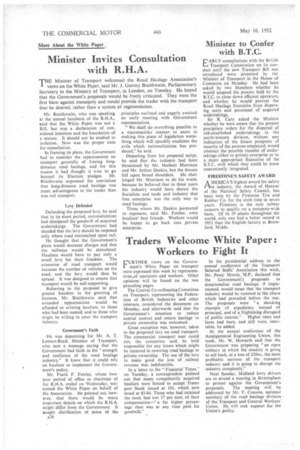Minister Invites Consultation with R.H.A.
Page 30

If you've noticed an error in this article please click here to report it so we can fix it.
THE Minister of Transport welcomed the Road Haulage Association's A views on the White Paper, said Mr. J. Gurney Braithwaite, Parliamentary Secretary to the Ministry of Transport, in London, on Tuesday. He hoped that the Government's proposals would be freely criticized. They were the first blow against monopoly and would provide the trader with the transport that he desired, rather than a system of regimentation.
Mr. Braithwaite, who was speaking at the annual luncheon of the R.H.A., said that the White Paper was not a Bill, but was a declaration of considered intention and the foundation of a statute. It should not be studied in isolation. Now was the proper time for consultation.
In framing its plans, the Government had to consider the repercussions on transport generally of freeing longdistance road haulage, and for this reason it had thought it wise to go beyond its Election pledges. Mr. Braithwaite expressed the conviction that long-distance road haulage was more advantageous to the trader than was rail transport.
Levy Defended Defending the proposed levy, he said that in its short period, nationalization had dissipated the goodwill of acquired undertakings. The Government had decided that the levy should be imposed only where road encroached upon rail.
He thought that the Government's plans would decrease charges and that the railways would be. stimulated. Ilauliers would have to pay only a small levy for their freedom. The extension of road transport would increase the number of vehicles on the road, and the levy would thus be spread. It was designed to ensure that transport would be self-supporting.
Referring to the proposal to give greater freedom in the granting of licences, Mr. Braithwaite said that extended opportunities would be afforded to existing hauliers, to those who had been ousted, and to those who might be willing to enter the transport industry.
Government's Faith He was deputizing for Mr. A. T. Lennox-Boyd, Minister of Transport, who sent a message saying that the Government had faith in the "strength and resilience of the road haulage industry." It knew that it could rely on hauliers to implement the Government's policy.
Mr. Frank F. Fowler, whose twoyear period of office as chairman of the R.H.A. ended on Wednesday, welcomed the White Paper on behalf of the Association. He pointed out, however, that there would be many important details on which the R.H.A. might differ from the Government. It sought clarification of some of the A28
principles outlined and eagerly awaited an early meeting with Government representatives.
"We shall do everything possible in a statesmanlike manner to assist in making this piece of legislation something which will speedily eradicate the evils which nationalization has produced," he said.
Departing from his prepared script, he said that the industry had been threatened by Mr. Herbert Morrison and Mr. Arthur Deakin, but the threats fell upon broad shoulders. He challenged Mr. Morrison to do his worst, because he believed that in three years the industry would have shown the Socialists and trade and industry that free .enterprise was the only way in road haulage.
Those whom Mr. Deakin purported to represent, said Mr. Fowler, were hauliers' best friends. Workers would be happy to go back into private enterprise.




















































































